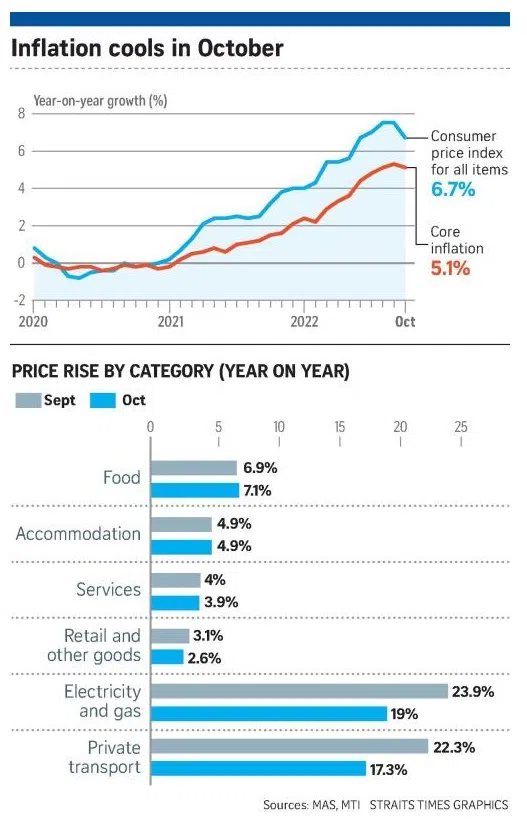Singapore core inflation eases to 5.1% in October, first drop in 8 months
Sign up now: Get ST's newsletters delivered to your inbox

October’s headline consumer price index or overall inflation came in at 6.7 per cent, down from September’s 7.5 per cent.
ST PHOTO: KUA CHEE SIONG
SINGAPORE - Core consumer prices in Singapore eased in October – the first dip since February this year – in what some economists say is a sign that inflation here may have peaked.
The better-than-expected data comes on the back of smaller hikes in prices of electricity and gas, as well as retail and other goods and services.
Core inflation, which excludes costs of private transport and accommodation and reflects the expenses of Singapore households more accurately, eased to 5.1 per cent year on year. This was lower than the 5.3 per cent rate in September, and matches the figure in August.
October’s headline consumer price index (CPI) or overall inflation came in at 6.7 per cent, led by an easing in private transportation inflation, the Monetary Authority of Singapore (MAS) and Ministry of Trade and Industry (MTI) said on Wednesday. This was lower than September’s 7.5 per cent.
October’s core inflation and headline CPI are both lower than Bloomberg’s forecast of 5.3 per cent and 7.1 per cent, respectively.
The respite comes as demand conditions in major economies soften, supply chain frictions continue to ease, and prices of energy and food commodities pull back from the peaks reached earlier in the year.
Economist Song Seng Wun believes “the worst of inflation pressures is behind us” but what is key now is “how much it will ease from this point”, while ING senior economist Nicholas Mapa said that the lower-than-expected reading “gives the MAS some breathing room” as core inflation has finally eased after seven months of acceleration.
Maybank’s regional co-head of macro research Chua Hak Bin thinks inflation “is showing signs of peaking or may have already peaked” as rising interest rates and tighter monetary policy start to dampen price pressures.
“A potential recession in the United States and Europe may accelerate the disinflation pressures and bring inflation down towards the comfort zones of the Federal Reserve and European Central Bank,” he said.
On the domestic front, Singapore’s labour market has been sizzling hot, but recent job cuts by technology and fintech firms should take some steam off the momentum, Dr Chua said, adding that the inflation risk may fall below the MAS inflation forecast in 2023, given the rising risks of a global recession.
MAS and MTI said on Wednesday that core inflation is expected to stay elevated in the next few quarters before slowing more discernibly in the second half of 2023 as the current tightness in the domestic labour market eases and global inflation moderates.
Overall inflation is expected to average around 6 per cent for the full year, while core inflation is projected to come in around 4 per cent, unchanged from MAS’ September forecasts.
For 2023, the overall inflation forecast is also unchanged at between 5.5 per cent and 6.5 per cent, with core inflation between 3.5 per cent and 4.5 per cent. These estimates take into account the upcoming increase in the goods and services tax.
Barclays’ senior regional economist Brian Tan said the easing of core inflation was unexpected and has reduced his 2022 core inflation forecast to 4.1 per cent from an earlier 4.2 per cent.
But he maintains the 2023 estimate at 4.2 per cent.
“Our base case is for the MAS to refrain from further foreign exchange policy tightening in 2023, though the risk of more adjustments remains significant,” he said.
Headline inflation eased on the back of lower inflation across all categories except accommodation and food, said MAS and MTI.
Across the categories, private transport inflation fell the most to 17.3 per cent in October from 22.3 per cent in September, led by a slower pace of car and petrol price hikes.
Electricity and gas inflation also dropped, to 19 per cent from 23.9 per cent in September, due to smaller increases in their tariffs.
Retail and other goods inflation dipped to 2.6 per cent, services inflation eased a tad to 3.9 per cent, while accommodation inflation stayed unchanged at 4.9 per cent.
Food inflation, however, edged up to 7.1 per cent in October from 6.9 per cent in September.
MAS and MTI said that on the domestic front, labour costs will go up further in the near term alongside robust wage growth.
The cost of utilities is also likely to remain elevated.
They said that companies are expected to continue to pass down accumulated import, labour and other business costs to consumers amid resilient demand.
Meanwhile, car and accommodation cost hikes are expected to stay firm in the quarters ahead amid tight certificate of entitlement quotas for cars and strong demand for rental housing.




